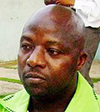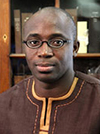By Marv Knox
A prayer vigil for the first Ebola patient in the United States turned into a memorial service for the virus’ first U.S. victim hours after Eric Duncan died in Dallas Oct. 8.
Wilshire Baptist Church planned the vigil to pray for Duncan’s recovery, Pastor George Mason told a crowd assembled on a warm and breezy Wednesday evening, the traditional time for Christian midweek prayer services.
 They also intended to pray for Duncan’s fiancée, Louise Troh, who joined the congregation this summer, Mason said. And they planned to pray for others quarantined in Dallas to prevent the deadly virus from spreading, as well as thousands of Ebola victims in West Africa and their loved ones.
They also intended to pray for Duncan’s fiancée, Louise Troh, who joined the congregation this summer, Mason said. And they planned to pray for others quarantined in Dallas to prevent the deadly virus from spreading, as well as thousands of Ebola victims in West Africa and their loved ones.
But Duncan died in nearby Texas Health Presbyterian Hospital Dallas that morning. “So, we are here now to remember Eric, our brother we never met, and to grieve with and for the love of his life, Louise Troh,” Mason said. “We are here to pray for God’s protection and peace” on Troh and Duncan’s family and friends.”
The disease’s isolating savagery prevented Troh and others whom Duncan contacted since arriving in Dallas from Liberia from attending the service, because they are quarantined, Mason noted. However, the church was attempting to stream the service to them over the Internet.
“Louise, if you can hear us, we love you, and we are praying for you,” he said.
 The unique nature of the Ebola outbreak was reflected in the faces of the vigil’s participants. They included members of Wilshire Church, predominantly white Americans, but also representatives of North Texas’ 10,000-member Liberian community, especially New Life Fellowship Church in Euless. A sprinkling of others gathered from across Dallas. TV crews and reporters stood in a side aisle.
The unique nature of the Ebola outbreak was reflected in the faces of the vigil’s participants. They included members of Wilshire Church, predominantly white Americans, but also representatives of North Texas’ 10,000-member Liberian community, especially New Life Fellowship Church in Euless. A sprinkling of others gathered from across Dallas. TV crews and reporters stood in a side aisle.
They heard and recited Scriptures, prayers and songs that echoed distinct themes — sorrow and grief, but also hope and community, as well as faith overcoming fear:
“I will lift up my eyes unto the hills. From where does my help come? My help comes from the Lord, maker of heaven and earth.”
“We are confused, but … our hope is in you, mighty God.”
“Lord, you have been our dwelling place. … Let the favor of the Lord, our God, be upon us.”
“God is our refuge and strength, an ever-present help in time of trials. … We will not fear.”
“God, be with us as we struggle to understand what it means to be a community … to speak truth to overcome fear.”
 Olu Menjay, president of the Liberia Baptist Missionary and Educational Convention, participated in the service because of a previously scheduled trip to meet with Baptists in Texas.
Olu Menjay, president of the Liberia Baptist Missionary and Educational Convention, participated in the service because of a previously scheduled trip to meet with Baptists in Texas.
“Today is a new day, with new challenges and possibilities” in Liberia and West Africa, where Ebola ravages the population, Menjay said.
“The death of Eric Duncan has put a real face on the Ebola outbreak in our country,” he said. “May we continue to seek God’s face, as there are so many people who are dying. …
“I pray we will seek the path of possibilities in these days ahead. We will be prisoners of hope as Liberians, as people of faith. … We will not lose heart.”
Mason acknowledged the reality of suffering, particularly for Troh, who joined Wilshire Church and was baptized by the congregation this summer. Because the church loves her, it suffers along with her.
“We do not regret suffering, because we love someone,” he said. “If you are open to suffering, you are open to joy.”
Duncan and Troh looked ahead to joy, Mason told the vigil/memorial crowd.
Years ago, they had a son, Karsiah. But mother and father became estranged, and mother and son moved to America.
Earlier this year, however, “Karsiah Eric Duncan and his mother, Louise, called for Eric Duncan to come from Liberia,” Mason said. “They wanted to renew their life together.”
Tragic disruption
Ebola disrupted their reunion. Duncan showed symptoms of the virus — which he reportedly contracted when he tried to help transport an infected pregnant woman to a hospital — before he had an opportunity to see Karsiah.
In fact, his last words, spoken to a Presbyterian Hospital nurse, were that he wanted to see his son, Mason said. “He was proud of his son.”
Troh told her pastor her fiancée was a Christian, a son respectful of his father and mother, a father who cared for his children. Duncan wanted to come to America to marry Troh, reunite with Karsiah, work hard, do well and then return to help build up Liberia, he said.
“‘Flesh and blood shall not inherit the kingdom of God,’” Mason said, quoting the Apostle Paul’s words in 1 Corinthians 15:50. “Thomas Eric Duncan had flesh-and-blood dreams. … Eric and Louise built a castle of dreams they never got to inhabit. … If [reality] is only flesh and blood, that dream died with Eric Duncan.”
But reality counters what is apparent, he insisted.
“The Apostle said only the imperishable can last forever, and that only begins when we die,” Mason said. “The Christian hope is in a new body. … Christians, you see, do not deny death. We defy it. [Death] is now, but it is not forever.” Because of the death and resurrection of Jesus, Christians look for a life beyond “flesh and blood.”
“This is not our wishes, but God’s promises to us,” he said. “We can give our brother Eric to God. We do so without fear.”
Fearlessness contrasts with the common response to Ebola, the pastor noted.
“For the past week, we have heard from people who are worried about this virus,” Mason said, calling Ebola “an unwelcomed guest.”
Ironically, however, people of faith can embrace the consequences of the virus, “not because it is good; it is bad,” but so they can see and participate in the redemptive ministry God has in store for them in the midst of tragedy and grief.
Ebola must not drive people away from each other, Mason pleaded.
“We move toward each other, because we know the end of the story” beyond flesh and blood, he said. “It ends well.”
Previous stories:
Dallas Ebola patient Eric Duncan dies
Dallas Baptist church supports Ebola family
First U.S. Ebola case hits home for Baptist church in Dallas
Related commentary:
